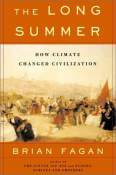


In his two previous books on weather/climate events and human history (Floods, Famines, and Emperors, The Little Ice Age), anthropologist Brian Fagan tackled the topics of El Niņos and their affect on civilizations, and the impacts of the Little Ice Age from 1300-1850. In this third book, The Long Summer: How Climate Changed Civilization, Fagan steps way back into prehistory to view the climate influence on rise and fall of humans from hunter/gatherers to the earliest civilizations, from 15,000 years ago to about 1200 CE.
The ongoing theme in these books is the dance between climate and civilization, and in The Long Summer, focuses on its first waltz with prehistoric peoples. The astute reader will see that Fagan also is warning us about the future, one that holds similar perils despite out "advanced" technologies. In these works, he has shown us that climate impacts on humanity have been both positive and negative and have had their effects on all peoples across the globe. And while he is also quick to point out that in few cases was climate change/variability the sole reason for the collapse of ancient civilizations, it was often the trigger or final straw.
The Long Summer draws its title from the extended period of global warming which began at the ending of the last great Ice Age and ends for his purposes with the onset of the Little Ice Age, one of the greatest setbacks in temperature through this extended stretch of warmth (there were other extended cooling periods during the sixteen millennia covered in the book). The author uses the book to
"argue that human relationships to the natural environment and short-term climatic change have always been in flux. To ignore climate is to neglect one of the dynamic backdrops of the human experience."
Fagan particularly looks at the rise of civilizations in what is now the Middle East, Europe and the Americas. Noticeably absent is any discussion of east Asian civilizations which is about the only negative point I can put forward on this volume.
Since in many cases, Fagan must work with archeological evidence rather than historical accounts, the subject lacks some of the contemporary accounts found in his previous two books. Nevertheless, The Long Summer is a very informative and enlightening read. The final page of the book, viewing the present and pondering the future, should be required reading for everyone.
I have read both of Fagan's previous books on this topic and rate this one in the middle, behind The Little Ice Age. I hope he has another to add to this trilogy, for the topic has long been neglected due in part to its association with earlier studies that tried to put a racially-biased aspect into climate influences.
If you have already read some of Fagan's works, this is a must read. If you have not, start with The Long Summer and work your way up the timeline. It is an eye-opener to connections between human society and the world in which it functions. If you, like I, are interested in the historical and social aspects of weather and climate, The Long Summer should be on your reading list.
Weather Doctor's Book Review: The Long Summer: How Climate Changed Civilization ©2004, Keith C. Heidorn, PhD. All Rights Reserved.
Correspondence may be sent to: Email: see@islandnet.com.